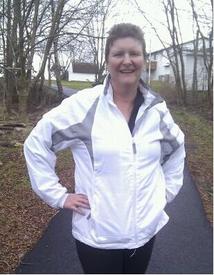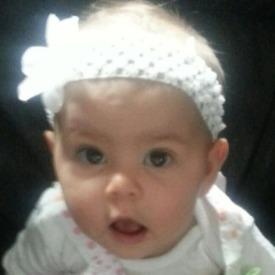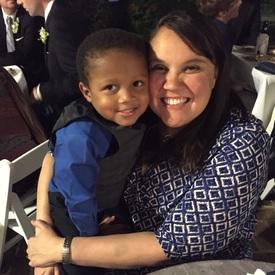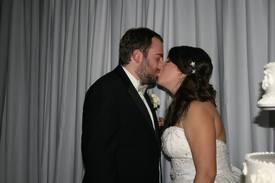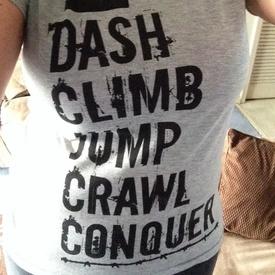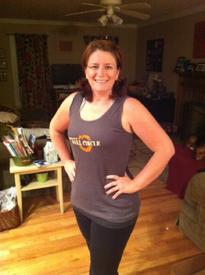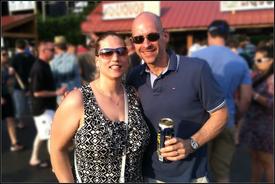You won't believe what my doc told me!!
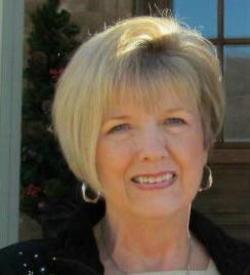
TheGreatYaYa
Posts: 215 Member
Went to see my endocrinologist last week and we were talking about my heart rate being high, which it has been for as long as I can remember, even when I was thin. Right now, my resting heart rate runs between 99 and 111. A few months ago, my primary care doc had put me on a medication to lower my heart rate, which, in turn, made my HRM stats lower. For a 3-mile walk on my treadmill, I would burn about 350 calories according to my HRM while on the med. Well, I talked her into taking me off of it with the promise that I would go see a cardiologist and get my heart checked. Sooooo, while OFF the med, my HRM records more like 550 cals burned for the same 3-mile walk! So, naturally, I don't want to be on any medication.
Long story short, I was explaining all this to my endocrinologist, and he just smiled and said, "No, you're going to burn the same number of calories regardless; it just means your heart isn't working as hard to do it." I looked at him like I didn't believe him and he said, "Ask the cardiologist when you see him and see what he tells you."
So, WTH...am I burning 350 cals or 550? Did I waste my money on a HRM? I"m totally clueless. Has anybody ever heard anything like this before?
I'm really bummed out about this. Ever since I bought the HRM, I've been thinking I'm really burning up the calories, and who knows, maybe I'm not.....
Long story short, I was explaining all this to my endocrinologist, and he just smiled and said, "No, you're going to burn the same number of calories regardless; it just means your heart isn't working as hard to do it." I looked at him like I didn't believe him and he said, "Ask the cardiologist when you see him and see what he tells you."
So, WTH...am I burning 350 cals or 550? Did I waste my money on a HRM? I"m totally clueless. Has anybody ever heard anything like this before?
I'm really bummed out about this. Ever since I bought the HRM, I've been thinking I'm really burning up the calories, and who knows, maybe I'm not.....
0
Replies
-
When you find out the answer let me know!! I have a fast resting heart rate too and maybe I'm over estimating my calorie burn with my HRM??... :-/ I sure hope not!!0
-
I have a heart rate monitor and a normal resting heart beat and I am not on any kind of medication at all.
My common sense tells me that regardless of your heart issues, whatever the HRM spits out should be pretty accurate and it is based upon how hard you are working out. One day I could use the HRM and do just a simple walk and I am going to burn less calories than if I were running or doing a high intensity workout on the elliptical. If you have a pretty good HRM like a Garmin, it is pretty accurate.0 -
HRM are not 100% accurate. Meds that affect heart rate also affecting HRM readings seems logical.0
-
Stop obsessing over your readings.
Are you losing weight with the number as is?
If yes, quit stressing and just work your program. If not, then lower your calorie burning input.
Simple deal.0 -
I'm sort of the opposite. I have a low resting heart rate, like 50-60 bpm, which I think is due to my blood pressure medicine. I bought a HRM and was so excited to finally see what I was burning and it told me I burned about 250 calories for a 60 minute step aerobics class. And let me tell you, I worked my butt off during that class, I felt like it should have been telling me I burned about 500 calories, but 250?? seemed completely off to me.
I've since stopped using my HRM because I bought it to help motivate me and instead it turned out to be the most unmotivating thing I've ever purchased.
So, long story short, I don't know if it's my low resting heart rate that gives me incorrect readings or if that really is what I burned.0 -
I think your doc is right. Your heart pumping away isn't actually what's determining how many cals you're burning, it's just that the HRM is using that as a gauge to assess how hard your body is probably working. It figures, "Damn, if that girl's HR is 180, she must be sprinting." I finally figured out that was the case with weight-lifting, which is why so few calories are burned doing it even if your HR is up. Just because your heart is beating hard, doesn't mean you are burning tons of calories. Sorry--it's sad b/c my HR runs hot, too, and my burn estimates are usually over the truth.0
-
Calories burned is a function of oxygen consumption not heart rate. It just happens that for most people there is some correlation. Obviously that's not the case for you.
Calories burned for the 3 mile run would be in the vicinity of the 350 calories, not the 550.0 -
This is one of the few places where you let your scale be your guide. Are you eating back 550 calories and still losing? Then you are okay. Are you eating 550 calories and staying the same or gaining? Then you're not. That simple.0
-
If you weigh about the same amount and it is taking you the same amount of time to walk those 3 miles then just based off common sense I agree with your Dr. If you weigh a considerably different amount and/or are doing it a LOT faster or slower then I think the calorie burn could be different. I have heard that HRMs don't work well for people who have abnormally high or low HRs unless it is a fancy watch that takes that into account, many do not.0
-
I have a very low resting rate (50-55). My HRM allows me to set my heart rate zone which is where I shoot for while working out. The higher I am in the zone the more calories I burn. This also means that the HRM is following my zone and not some pre-calcuated zone based on charts of people who don't have my low resting rate.0
-
The doc is right... you're body at rest runs a heart rate higher than the norm, therefore your burn zone is going to be higher than the norm. It's going to be difficult to determine your exact numbers because your HR is always up - your BMR may be higher than calculated too because your heart is working harder/faster than normal. I know it seems like a good thing to have a fast heart rate, but imagine that your heart at rest is doing what mine does during light cardio - which means all day everyday your heart is overworking - over time that can lead to bigger problems.
PS - please do see the cardiologist0 -
To the OP: I would be more concern in getting my heart check and finding out if everything is OK and why the resting hear rate is so high than trying to figure out which HRM reading is correct.
As Valerie explained in her post, the doctor is probably correct. You start your workout with a HR of 110 and within few minutes go to 180, WOW, this girl is really rocking! But if you start at 75 and in the same amount of time, your HR goes to 125, your HRM figures that you are not working hard enough.
Please have your cardiologist check you out; the health of your heart is more important than the accuracy of your HRM. Of course, this is my opinion.0 -
This makes me glad that I have a BodyMedia armband instead of an HRM. It measures calorie burn by a different set of parameters than heartrate, which can be affected heavily by medications, certain diseases, even your level of fitness (my father is 65 and runs regularly and his resting heartrate is much lower than the average 65 year old due to his running).0
-
Over the past year, my doctor (he's a GP who specializes in weight loss and fitness, not a chiropractor) has gone from being in the calories in/calories out, low fat diet camp to being in the low carb camp. He said this past week what your cardiologist says: use a HRM to monitor your cardio fitness and workouts, but heart rate is unrelated to weight loss. So apparently is the amount of fat you consume, and the amount of exercise you do. And this is the doctor who a few years ago had me on a 50 grams of fat per day diet. The fact that this measured and logical person has changed his position on this made me sit up and take notice; he says he's been moving his weight loss patients to a low-carb paradigm since last spring, and he sees a real positive difference in both weight loss and cardio fitness. I'm still in shock at what I heard from him during my biannual checkup.
He gave me a handout he's written, which includes a bibliography. The controlling factor in fat metabolism is apparently insulin, and it's carbs that control insulin. So after being on a plateau for some months on a low-fat diet, I've switched to low carb per his advice and the weight is coming off again. The books he recommended are "Why We Get Fat" (newer and condensed version of "Good Calories, Bad Calories") by Gary Taubes, and "Food Rules" and "In Defense of Food", by Michael Pollan. The only one I have so far is "Why We Get Fat" and it's a compelling read.
So I'm concentrating on veggies, good protein, and limiting complex carbs and fruits, and staying away from the refined sugar and starches (I love my treats, and it turns out "low fat" but high carb treats are no treat for my body). I'm also eating when I'm hungry and stopping when I'm full. I'm exercising for cardio fitness rather than weight loss. I use the MFP app on my iPad as a food journal, and to monitor my carb intake, water intake, and exercise. No calorie or fat counting, no carb counting, just better choices ... and I only weigh myself once a week since I know (being a software engineering type) I can easily become obsessive about measuring things.0 -
This is one of the few places where you let your scale be your guide. Are you eating back 550 calories and still losing? Then you are okay. Are you eating 550 calories and staying the same or gaining? Then you're not. That simple.
This, though I will say it is NOT a good reason to not go on medication your doctor feels you need. I would say your doctor would know more than most people on this site.0 -
HRM's are not nearly as accurate a reader of calories as people make them out to be. The HRM is really only slightly more accurate than a read out on the machine. It makes an estimation of the number of calories you should be burning based off of your body profile and heart rate, but doesn't actually measure the number of calories your body is burning.
That being said, even if being off your medicine did cause you to burn more calories on the treadmill, not taking your heart medicine so that you can burn an extra 200 calories a walk is INSANE. It's more important to be healthy than to lose weight faster.0 -
You have to make sure you set your HRM to the correct resting heart rate for you. So if my resting heart rate is 70 and my max is 160, My 'zone' for burning calories is between 100 to 160. Make sure if your resting is 111 and your max is 200, you are programming that into your HRM so your calorie count will be more accurate.

Created by MyFitnessPal.com - Free Calorie Counter0 -
Great point. This is a journey, not a foot race. Stay calm and focused on your goals.0
-
He gave me a handout he's written, which includes a bibliography. The controlling factor in fat metabolism is apparently insulin, and it's carbs that control insulin. So after being on a plateau for some months on a low-fat diet, I've switched to low carb per his advice and the weight is coming off again. The books he recommended are "Why We Get Fat" (newer and condensed version of "Good Calories, Bad Calories") by Gary Taubes, and "Food Rules" and "In Defense of Food", by Michael Pollan. The only one I have so far is "Why We Get Fat" and it's a compelling read.
Another great book: The Sugar Solution. It talks a lot about insulin resistance, which is "pre-diabetes." Very interesting read.0 -
HRM's are not nearly as accurate a reader of calories as people make them out to be. The HRM is really only slightly more accurate than a read out on the machine. It makes an estimation of the number of calories you should be burning based off of your body profile and heart rate, but doesn't actually measure the number of calories your body is burning.
That being said, even if being off your medicine did cause you to burn more calories on the treadmill, not taking your heart medicine so that you can burn an extra 200 calories a walk is INSANE. It's more important to be healthy than to lose weight faster.
OF COURSE, I'm going to take medication if the cardiologist says I need it! I"m not CRAZY; I do want to live! My heart rate has been fast my entire life (I'm 57) and no doctor EVER has said anything about it until now.0 -
Don't be afraid to get another opinion if you don't think you doctor is right...not all doctors are good, and know what they're talking about.
Be sure to question this with the cardiologist when you go, and in the meantime, err on the lower-burn side for tracking...otherwise if you're eating back exercise calories, you may very well be going over.0 -
You have to make sure you set your HRM to the correct resting heart rate for you. So if my resting heart rate is 70 and my max is 160, My 'zone' for burning calories is between 100 to 160. Make sure if your resting is 111 and your max is 200, you are programming that into your HRM so your calorie count will be more accurate.

Created by MyFitnessPal.com - Free Calorie Counter
I agree with this - if your HRM doesn't have the right settings it will never be right - I have a Polar one and I had to go through all these different things to get the settings right when I first got it - so it could record my resting heart rate to get a more accurate burn rate0 -
You have to make sure you set your HRM to the correct resting heart rate for you. So if my resting heart rate is 70 and my max is 160, My 'zone' for burning calories is between 100 to 160. Make sure if your resting is 111 and your max is 200, you are programming that into your HRM so your calorie count will be more accurate.

Created by MyFitnessPal.com - Free Calorie Counter
I agree with this - if your HRM doesn't have the right settings it will never be right - I have a Polar one and I had to go through all these different things to get the settings right when I first got it - so it could record my resting heart rate to get a more accurate burn rate
I have a Polar FT7 but it doesn't have a place for me to set a resting heart rate (at least not one that I can find). It has my weight, height, birthdate, and sex and it set my max HR at 163, which is much too high for me. I generally keep it around 145-150 range when I'm working out.
To figure maximum heart rate you subtract your age from 220. Then your max heart rate when working out should not be more than 80 to 85% of that number. For example: 220 minus 57 (my age) = 163. 85% of 163 equals 138, so really I should not let my heart rate go over 138 (if I had a normal resting rate). But since I don't, I let it go up to 150.0 -
You have to make sure you set your HRM to the correct resting heart rate for you. So if my resting heart rate is 70 and my max is 160, My 'zone' for burning calories is between 100 to 160. Make sure if your resting is 111 and your max is 200, you are programming that into your HRM so your calorie count will be more accurate.

Created by MyFitnessPal.com - Free Calorie Counter
I agree with this - if your HRM doesn't have the right settings it will never be right - I have a Polar one and I had to go through all these different things to get the settings right when I first got it - so it could record my resting heart rate to get a more accurate burn rate
I have a Polar FT7 but it doesn't have a place for me to set a resting heart rate (at least not one that I can find). It has my weight, height, birthdate, and sex and it set my max HR at 163, which is much too high for me. I generally keep it around 145-150 range when I'm working out.
To figure maximum heart rate you subtract your age from 220. Then your max heart rate when working out should not be more than 80 to 85% of that number. For example: 220 minus 57 (my age) = 163. 85% of 163 equals 138, so really I should not let my heart rate go over 138 (if I had a normal resting rate). But since I don't, I let it go up to 150.
I have the polar FT7 as well and I don't think it's set correctly, but even after going through all the stuff online and the book it came with, I couldn't figure out how to fix it. If I use this equation it puts me between 165-175 max heart rate, which I will never get up to. My highest is usually around 152, but more likely in the 140's. So maybe that will be a good starting point for me.0 -
To the OP: I would be more concern in getting my heart check and finding out if everything is OK and why the resting hear rate is so high than trying to figure out which HRM reading is correct.
As Valerie explained in her post, the doctor is probably correct. You start your workout with a HR of 110 and within few minutes go to 180, WOW, this girl is really rocking! But if you start at 75 and in the same amount of time, your HR goes to 125, your HRM figures that you are not working hard enough.
Please have your cardiologist check you out; the health of your heart is more important than the accuracy of your HRM. Of course, this is my opinion.
This is what I wanted to say, just my opinion0 -
My question is did you reset your resting HR after going on the meds? If not than the reading was incorrect. Either way, you wouldn't burn calories any different it's all about your resting HR and getting up to the Target Heart Range (I try for 75-90%).0
-
Went to see my endocrinologist last week and we were talking about my heart rate being high, which it has been for as long as I can remember, even when I was thin. Right now, my resting heart rate runs between 99 and 111. A few months ago, my primary care doc had put me on a medication to lower my heart rate, which, in turn, made my HRM stats lower. For a 3-mile walk on my treadmill, I would burn about 350 calories according to my HRM while on the med. Well, I talked her into taking me off of it with the promise that I would go see a cardiologist and get my heart checked. Sooooo, while OFF the med, my HRM records more like 550 cals burned for the same 3-mile walk! So, naturally, I don't want to be on any medication.
Long story short, I was explaining all this to my endocrinologist, and he just smiled and said, "No, you're going to burn the same number of calories regardless; it just means your heart isn't working as hard to do it." I looked at him like I didn't believe him and he said, "Ask the cardiologist when you see him and see what he tells you."
So, WTH...am I burning 350 cals or 550? Did I waste my money on a HRM? I"m totally clueless. Has anybody ever heard anything like this before?
I'm really bummed out about this. Ever since I bought the HRM, I've been thinking I'm really burning up the calories, and who knows, maybe I'm not.....
It's unusual to find a doctor (esp an endocrinologist) that well versed in the specifics of exercise physiology, but, overall, the answer would be "yes".
Aerobic activities like walking have a relatively fixed energy cost. For example, walking 4 mph is about 4.2 METs. That's pretty much the same for everyone. You calories burned is based on your body weight times the intensity. Heart rate has nothing to do with it.
HRMs can be useful in some instances, but a HRM is using heart rate to try and "estimate" your aerobic intensity--it doesn't actually measure it.
Heart rate, however, is a RELATIVE scale, not a fixed one. The actual heart rate -- 100bpm, 120bpm, 150bpm, etc --is meaningless. The significance is: What percentage of your MAXIMUM heart rate does your exercise heart rate represent?
An exercise heart rate that is 75% of maximum is significant, regardless of what that number is. Before medication, 75% of your maximum might have been a heart rate of 160, after taking medication that lowers maximum heart rate, 75% of your maximum might now only be 115 beats/min. However, since that new heart rate is STILL 75% of your maximum, your calorie burn should be roughly the same.
To get any sort of accuracy at all out of an HRM, it is essential that you program the setup information as accurately as possible. An HRM will, by default, use an age-predicted HRmax number when you set it up and enter your age and gender. However, the equations used to estimate HRmax by using age can be off by 15 -30 beats/min.
If the HRM has defaulted to an age-predicted HRmax, but your true HRmax is 20-30 beats higher, then the HRM assumes you are working at a much higher intensity and will significantly overestimate calories burned.
Conversely, if one takes a medication that LOWERS HRmax, then the HRM assumes the lower heart rate number means you are just cruising and it will UNDERestimate calories.
Unless you can take a no-hands symptom-limited stress test that takes you to max effort every time you change meds, I'm afraid an HRM is not going to be very accurate at all.0 -
I have a heart rate monitor and a normal resting heart beat and I am not on any kind of medication at all.
My common sense tells me that regardless of your heart issues, whatever the HRM spits out should be pretty accurate and it is based upon how hard you are working out. One day I could use the HRM and do just a simple walk and I am going to burn less calories than if I were running or doing a high intensity workout on the elliptical. If you have a pretty good HRM like a Garmin, it is pretty accurate.
Only if your setup info is accurate and only if your HR response to exercise matches the assumptions underlying the algorithms that estimate calories burned. If someone is taking medication that affects HR, then neither of those will be true.0 -
I'm sort of the opposite. I have a low resting heart rate, like 50-60 bpm, which I think is due to my blood pressure medicine. I bought a HRM and was so excited to finally see what I was burning and it told me I burned about 250 calories for a 60 minute step aerobics class. And let me tell you, I worked my butt off during that class, I felt like it should have been telling me I burned about 500 calories, but 250?? seemed completely off to me.
I've since stopped using my HRM because I bought it to help motivate me and instead it turned out to be the most unmotivating thing I've ever purchased.
So, long story short, I don't know if it's my low resting heart rate that gives me incorrect readings or if that really is what I burned.
See my other remarks for an explanation.0 -
I think your doc is right. Your heart pumping away isn't actually what's determining how many cals you're burning, it's just that the HRM is using that as a gauge to assess how hard your body is probably working. It figures, "Damn, if that girl's HR is 180, she must be sprinting." I finally figured out that was the case with weight-lifting, which is why so few calories are burned doing it even if your HR is up. Just because your heart is beating hard, doesn't mean you are burning tons of calories. Sorry--it's sad b/c my HR runs hot, too, and my burn estimates are usually over the truth.
By George, she's got it!
If you are not taking medications, it might be possible to get a sense of your true HRmax and get some better accuracy. It means doing some hard intervals, but you can get in the neighborhood.
For your age, most estimates will put your HRmax at 180. If you find you are getting to the 160s-170s with just a medium to medium hard effort, you could reset the HRmax in your HRM to 195 or 200 and that should improve the accuracy.0
This discussion has been closed.
Categories
- All Categories
- 1.4M Health, Wellness and Goals
- 398.5K Introduce Yourself
- 44.7K Getting Started
- 261K Health and Weight Loss
- 176.4K Food and Nutrition
- 47.7K Recipes
- 233K Fitness and Exercise
- 462 Sleep, Mindfulness and Overall Wellness
- 6.5K Goal: Maintaining Weight
- 8.7K Goal: Gaining Weight and Body Building
- 153.5K Motivation and Support
- 8.4K Challenges
- 1.4K Debate Club
- 96.5K Chit-Chat
- 2.6K Fun and Games
- 4.8K MyFitnessPal Information
- 18 News and Announcements
- 21 MyFitnessPal Academy
- 1.5K Feature Suggestions and Ideas
- 3.2K MyFitnessPal Tech Support Questions





